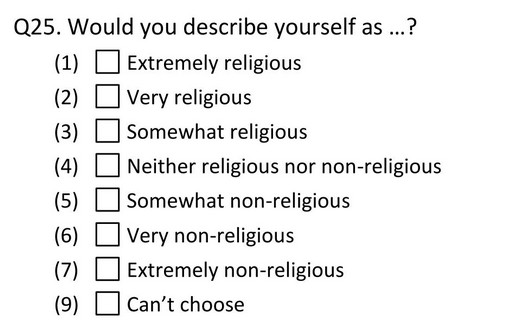ISSP Surveys on Religion in Japan
"The International Social Survey Programme (ISSP) is a continuous programme of cross-national collaboration running annual surveys on topics important for the social sciences. The program started in 1984 with four founding members - Australia, Germany, Great Britain, and the United States – and has now grown to about 50 member countries from all over the world."* In Japan, the surveys on religion were conducted by the Japan Broadcasting Corporation (NHK) (1998, 2008, 2018). The nearly 50 tables provide a comprehensive overview of the situation of religion in Japan in recent decades. They are presented and commented on in an article by Toshiyuki Kobayashi, published in April 2019. All Japanese quotations in the right-hand column refer to this. The original English version (with a few modifications), further details and comments can be found on the left.
The English questionnaire
The first 6 questions do not yet refer directly to religion.
Q1. If you were to consider your life in general these days, how happy would you say you are on the whole? Circle one.
(1) Very happy
(2) Fairly happy
(3) Not very happy
(4) Not at all happy
(5) Can’t choose
(6) Invalid
Q2. How satisfied are you with your relationships with family members? Circle one.
(1) Completely satisfied
(2) Very satisfied
(3) Fairly satisfied
(4) Neither satisfied nor dissatisfied
(5) Fairly dissatisfied
(6) Very dissatisfied
(7) Completely dissatisfied
(8) Can’t choose
(9) Invalid
The data for the previous years are missing here because this question was not asked there.
Excerpts from:

放送研究と調査、April 2019, pp. 52-72
Tables (pp. 64-71):
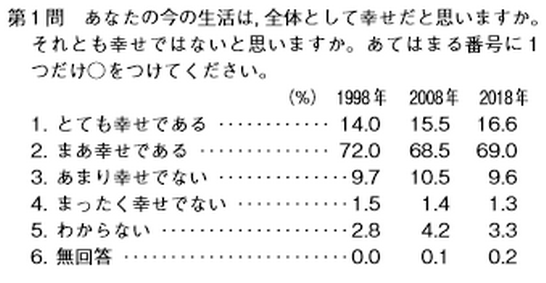
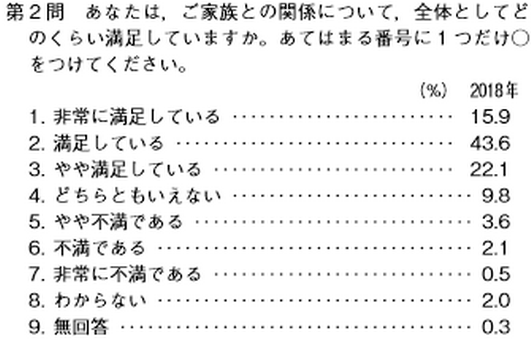
[Noticeable increases and decreases in the percentages are marked by corresponding arrows.]
Q3. Do you think it is wrong or not wrong if a married person has sexual relations with someone other than his or her husband or wife? Circle one.
(1) Always wrong
(2) Almost always wrong
(3) Only sometimes wrong
(4) Not wrong at all
(5) Can’t choose
(6) Invalid
Q4. And what about sexual relations between two adults of the same sex? Circle one.
(1) Always wrong
(2) Almost always wrong
(3) Only sometimes wrong
(4) Not wrong at all
(5) Can’t choose
(6) Invalid
Q5. Do you personally think it is wrong or not wrong for a woman to have an abortion if the family has very low income and cannot afford any more children? Circle one.
(1) Always wrong
(2) Almost always wrong
(3) Only sometimes wrong
(4) Not wrong at all
(5) Can’t choose
(6) Invalid
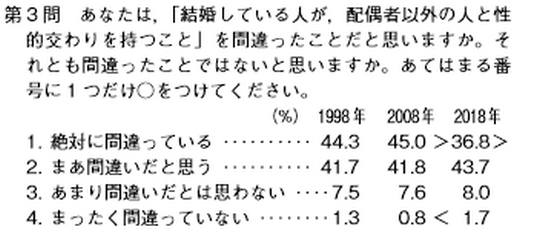

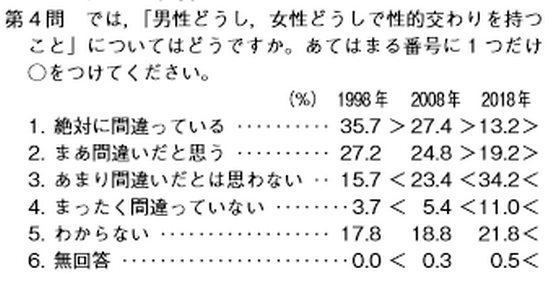
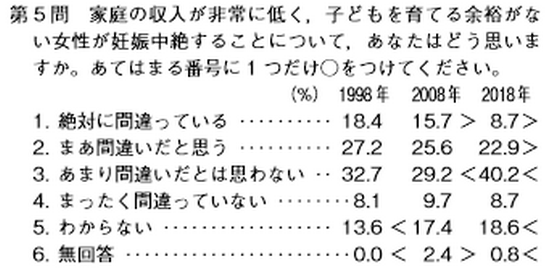
Q6. To what extent do you agree or disagree with the following statement?
“A husband’s job is to earn money; a wife’s job is to look after the home and family.” Circle one.
(1) Strongly agree
(2) Agree
(3) Neither agree nor disagree
(4) Disagree
(5) Strongly disagree
(6) Can’t choose
(7) Invalid
Q7. How much confidence do you have in each of the following groups?
Please tick one box in each row.
1. Complete confidence 2. A great deal of confidence 3- Some confidence 4. Very little confidence 5. No confidence at all 6. Can’t choose 7. Invalid
A) The Parliament
B) Business and industry
C) Temples, Shrines and religious organisations
D) Courts and the legal system
E) Schools and the education system
Trust in religious organisations in Japan is not particularly high, but is similar to that in parliament, with significant increases in both cases.
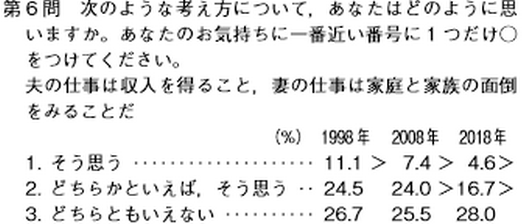

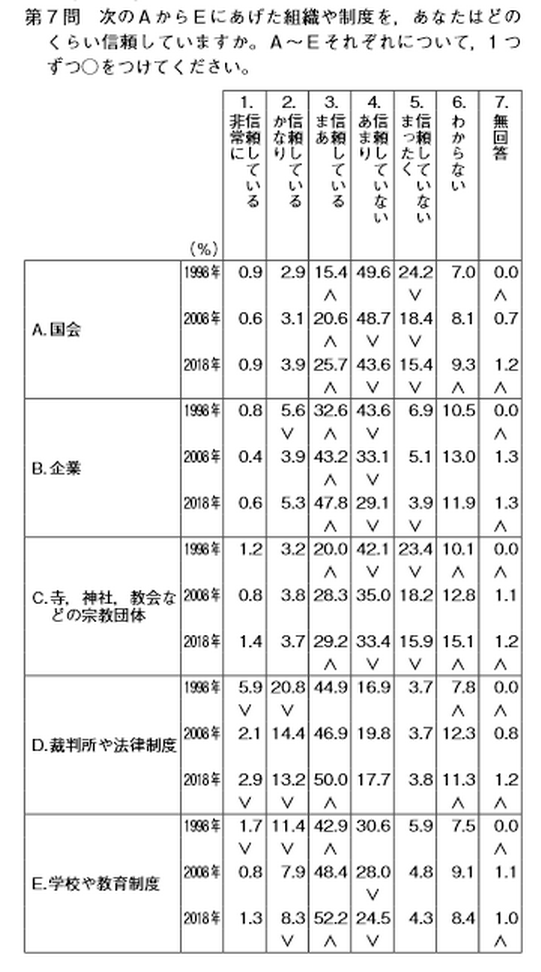
Q8. To what extent do you agree or disagree with the following statement?
“Religious leaders should not try to influence how people vote in elections.” Circle one.
(1) Strongly agree
(2) Agree
(3) Neither agree nor disagree
(4) Disagree
(5) Strongly disagree
(6) Can’t choose
(7) Invalid
This kind of electoral interference also exists in Japan, which I discuss elsewhere.
Q9. To what extent do you agree or disagree with the following statements?
Please tick one box in each row.
1. Strongly agree 2. Agree 3. Neither agree nor disagree 4. Disagree 5. Strongly disagree 6. Can’t choose
a) We trust too much in science and not enough in religious faith
b) Looking around the world, religions bring more conflict than peace
c) People with very strong religious beliefs are often too intolerant of others
Question C. is mistranslated in Japanese. The "others" are understood as non-strict believers.
Q10. Do you think that churches and religious organisations in Japan have too much power, or too little power? Circle one.
(1) Far too much power
(2) Too much power
(3) About the right amount of power
(4) Too little power
(5) Far too little power
(6) Can’t choose
(7) Invalid
The high number of non-responses is striking. This is probably due to a general lack of interest and knowledge about religious organisations.
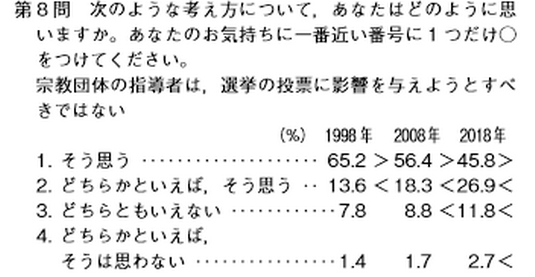

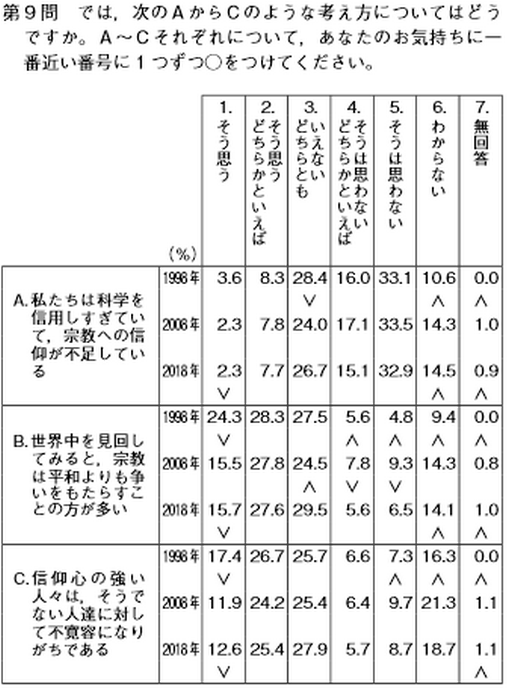
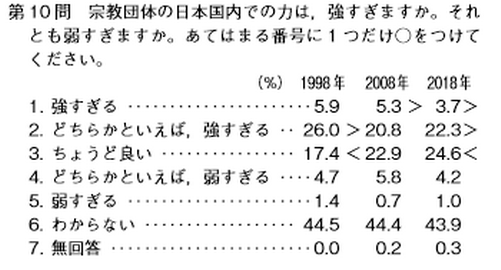
Q11. People have different religions and different religious views. Would you accept a person from a different religion or with a very different religious view from yours marrying a relative of yours?
(1) Definitely accept
(2) Probably accept
(3) Probably not accept
(4) Definitely not accept
(5) Can’t choose
(6) Invalid
Q12. There are some people whose views are considered extreme by the majority. Consider religious extremists, that is, people who believe that their religion is the only true faith and that all other religions should be considered as enemies. Do you think such people should be allowed to …?
Please tick one box in each row.
1. Definitely 2. Probably 3. Probably not 4. Definitely not 5. Can’t choose
A) Hold public meetings to express their views?
B) Publish their views on the Internet or social media?
In Japanese, specific examples of social media are listed in a footnote.
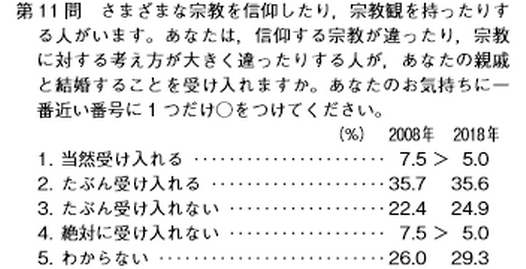
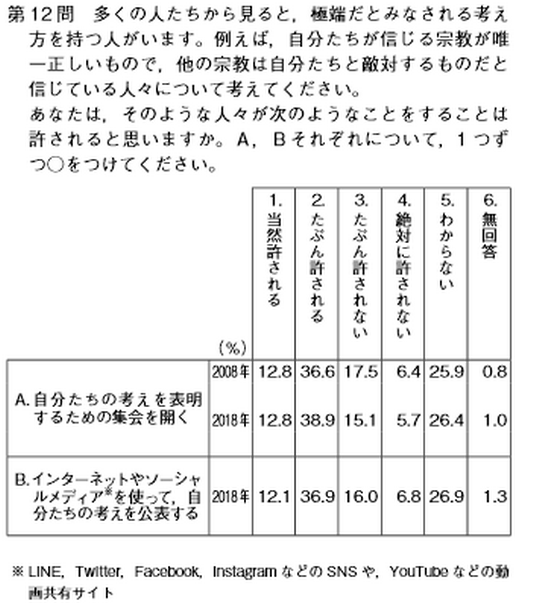
Q13. Please indicate which statement below comes closest to expressing what you believe about God. Circle once.
(1) I do not believe in God
(2) I do not know whether there is a God, and I do not believe there is any way to find out
(3) I do not believe in a personal God, but I do believe in a Higher Power of some kind
(4) I find myself believing in God at some times, and not believing at others
(5) While I have doubts, I feel that I do believe in God
(6) I know God really exists, and I have no doubts about it
(7) Invalid
Question 3 in Japanese reads: I don't believe that God exists, but I do believe that there is such a thing as supernatural power.
Question 5 in Japanese reads: Although I sometimes have doubts, I believe in God.
Q14. Which of the following best describes your beliefs about God? Circle one.
(1) I do not believe in God now, and I never have
(2) I do not believe in God now, but I used to
(3) I believe in God now, but I did not used to
(4) I believe in God now, and I always have
(5) Can’t choose
(6) Invalid
Q15. Do you believe in each of the following?
Please tick one box in each row.
1. Yes, definitely 2. Yes, probably 3. No, probably not 4. No, definitely not 5. Can’t choose 6. Invalid
A) Life after death
B) Heaven
C) Hell
D) Religious miracles
E) Supernatural powers of deceased ancestors
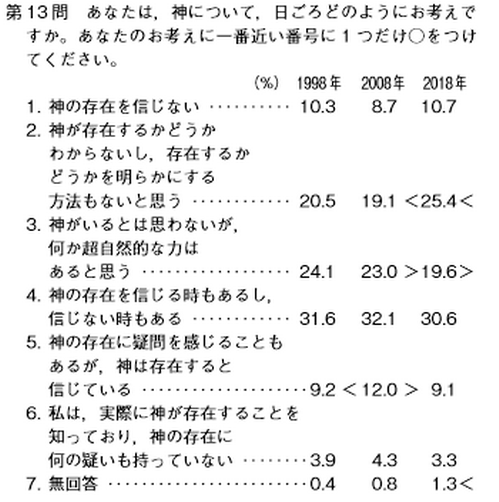


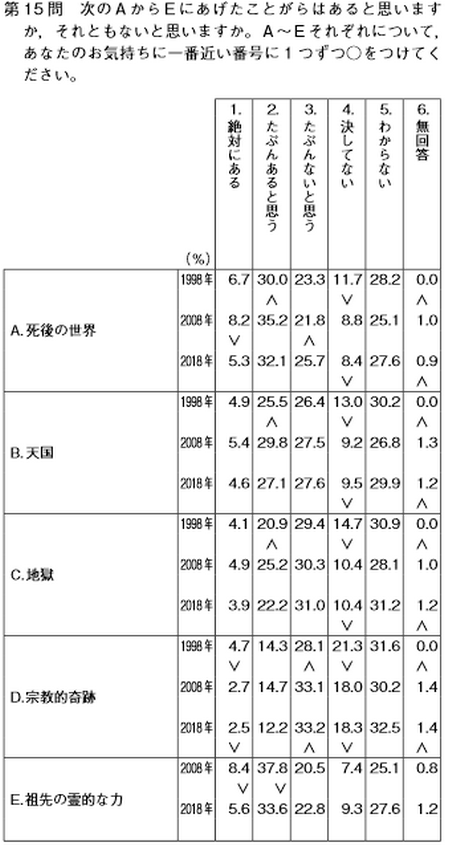
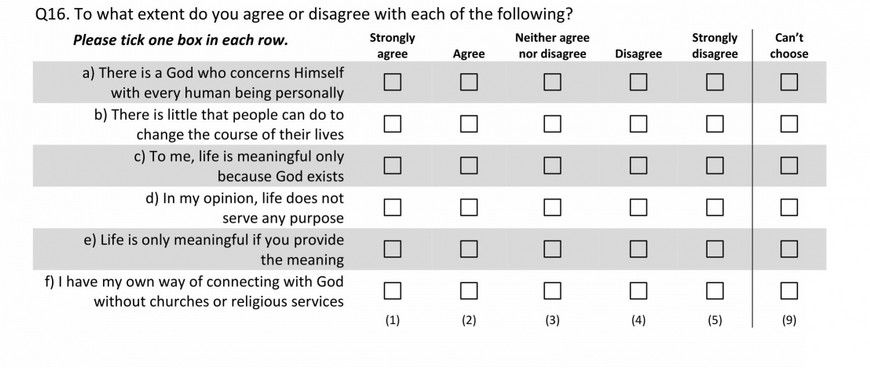
The answers in Japanese are: 1. I believe 2. I tend to believe 3. neither 4. I tend not to believe 5. I don't believe 6. I don't know. 7. Not relevant
Statement a) reads: God exists for all people.
And b): It is not possible for people to change their own destiny.

6. Invalid
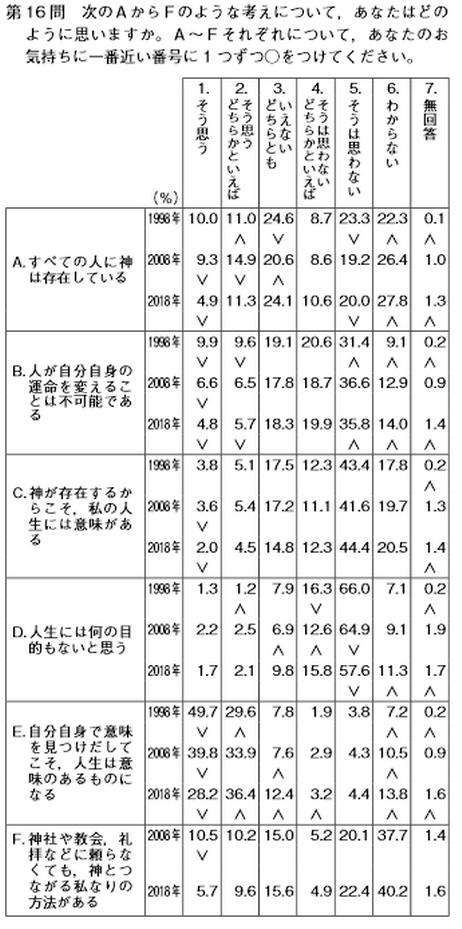
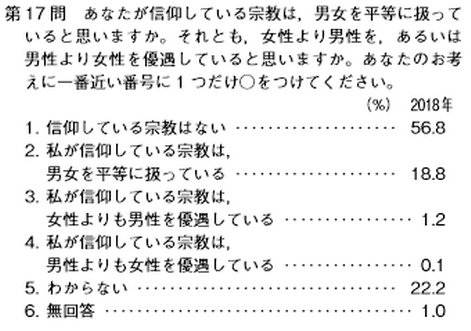
The following three tables are particularly revealing in terms of the actual religious affiliation of people in Japan.
The list of religions in the Japanese questionnaire is:
1. Budddhism
2. Shintō
3. Christianity
4. Other religion
5. Mother/father was not a believer
6. Had no mother/father
7. Cannot say
8. Invalid
The questionnaire first asks about the faith of the mother (no. 18) and father (no. 19) when the person was a child.
Then the questionnaire asks about the person's faith as a child (No. 20).
1. Buddhism
2. Shintō
3. Christianity
4. Other religion
5. Was not a believer
6. Cannot say
7. Invalid
It is noteworthy here that, compared to the first two tables, the numbers are almost halved for Buddhism and Shintō, and almost doubled for Christianity.
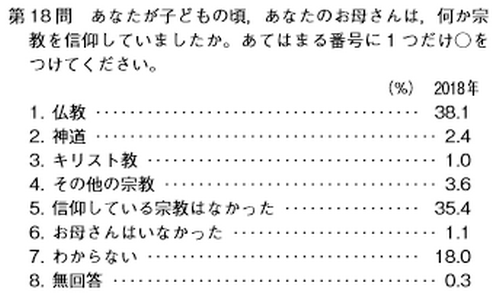
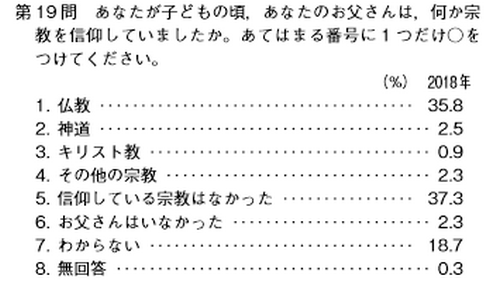
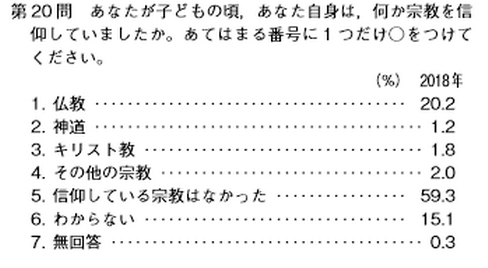
Following the same pattern, the next three questions are about religious activities. In the Japanese question, these include shrine and temple visits (except at New Year and weddings or funerals).
[The numbers of the following questions differ from the Japanese. Answer 12 means: Invalid.]
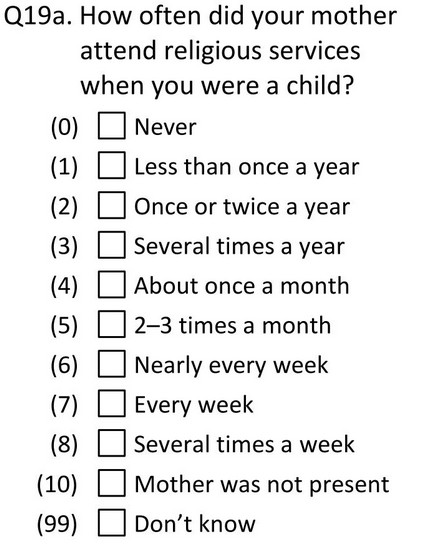
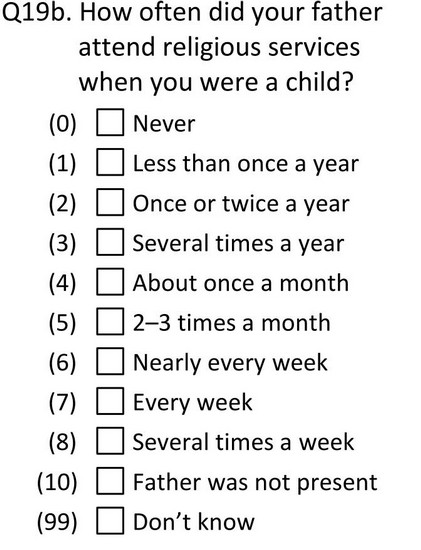
[In several of the following questions, the numbers on the right are all 1 higher. The last answer means: Invalid.]
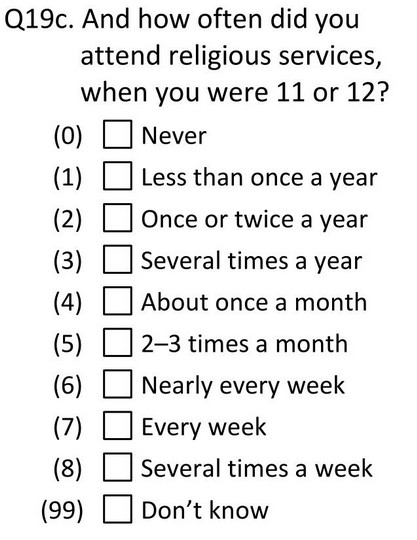
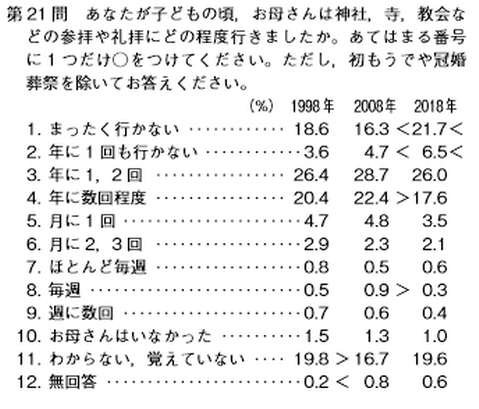
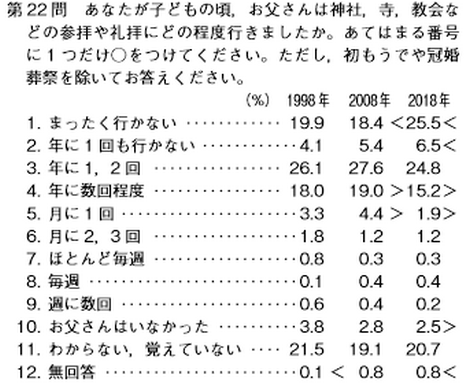
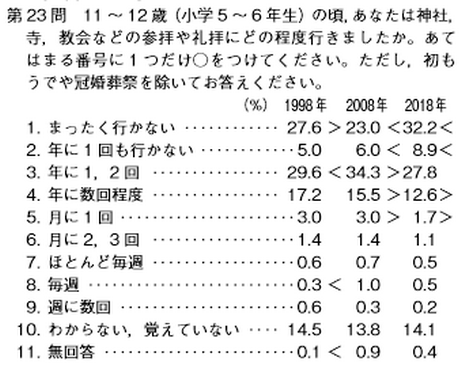
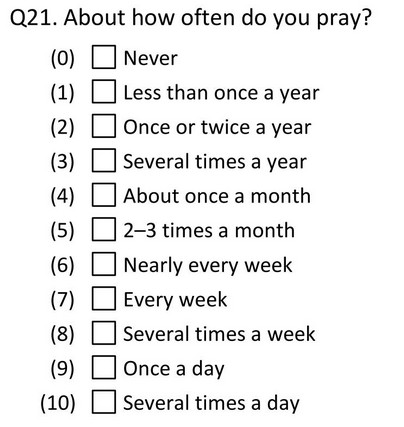
While most Japanese, including many non-believers, pray at least occasionally, in the following table the number of those who participate in activities of temples, shrines, churches, etc. (according to the Japanese text) roughly corresponds to the number of believers.
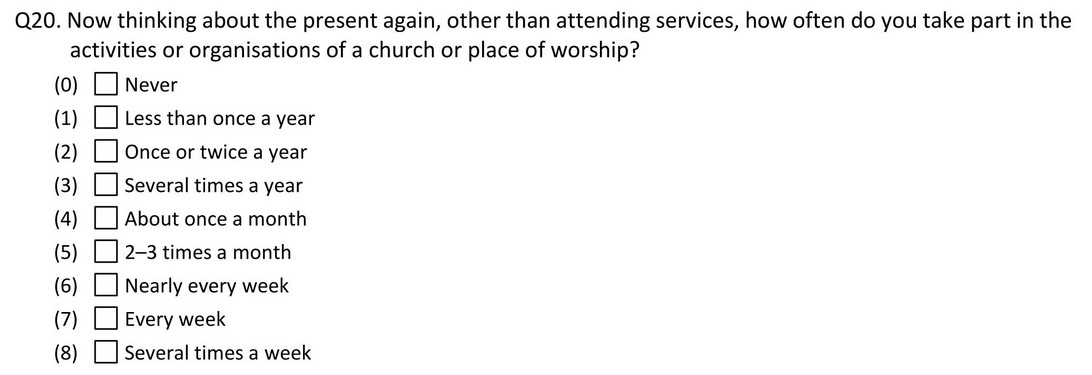
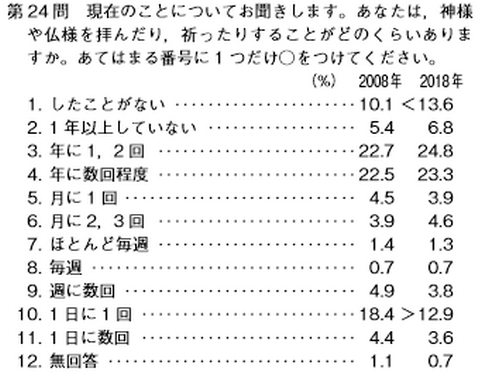
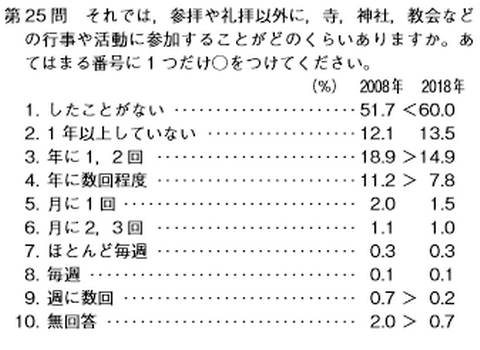
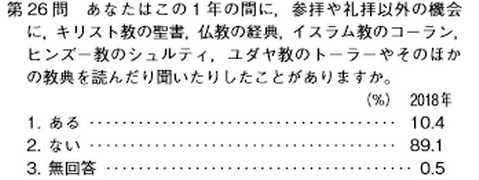
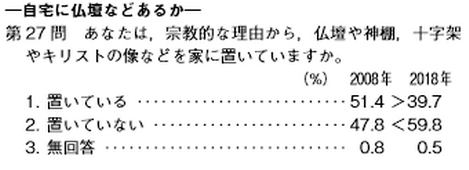
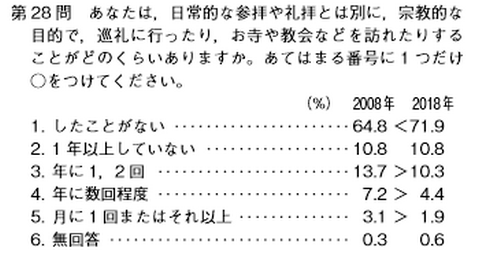
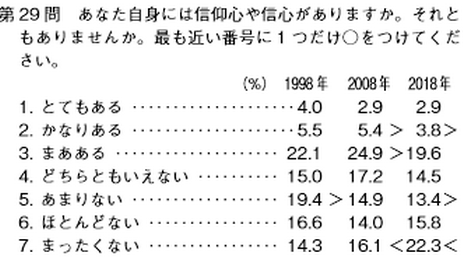



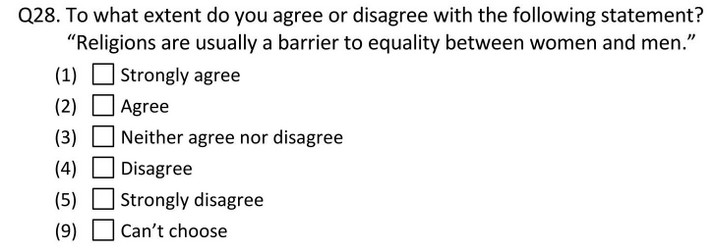
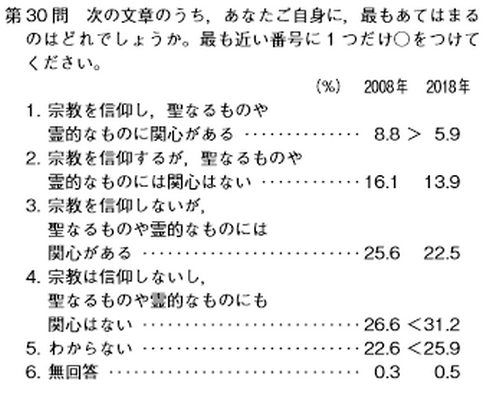
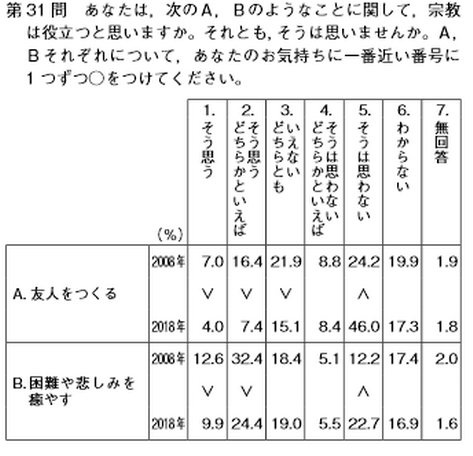
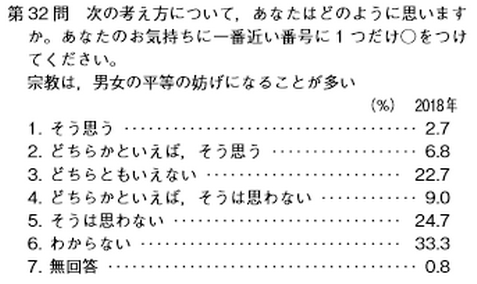


Here, in Japanese, the question refers to Japan, of course.

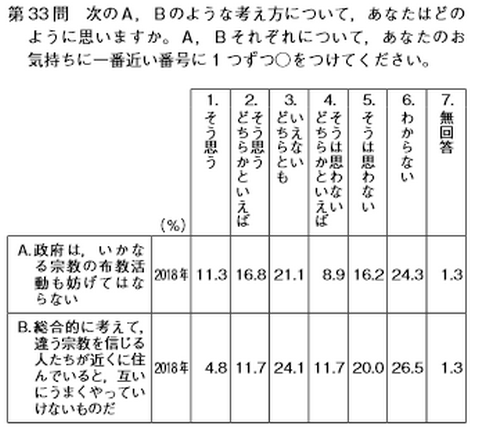
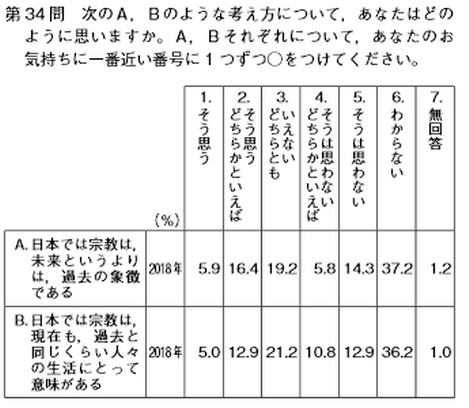
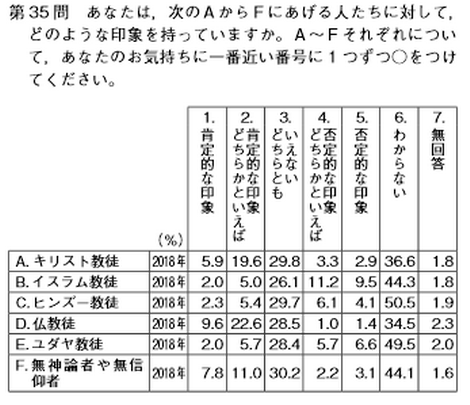
The last four questions have been completely reformulated by the Japanese side, with good reasons, and supplemented by some additional questions that are adapted to the situation in Japan and are therefore particularly interesting for understanding religion in Japan.
The first two questions refer to a Japanese peculiarity, Shintoist (no. 36) and Buddhist house altars (no. 37), which play an important role in many families in connection with ancestor veneration. This is especially true for the Buddhist ones, and (in contrast to the Shinto ones) even with a slightly increasing tendency, as the two tables show (answer 5).
The question asks how often someone prays in front of the respective house altar, and the possible answers are: 1. Daily 2. Sometimes 3. Happens 4. Never 5. Have no house altar 6. No answer.
No. 38 is about what one thinks of statements A-E. Possible answers: 1. I believe 2. I don't believe 3. Neither 4. No answer. The statements are:
A. If I ask a god or Buddha for something, I feel that it will somehow come true.
B. Whether gods or Buddha, what I need is something I can rely on internally.
C. Even if others don't know about it, if a person does something bad, it will definitely not go unpunished.
D. For man there is a fate against which he cannot defend himself by his own strength.
E. I feel a deep inner connection with the ancestors.
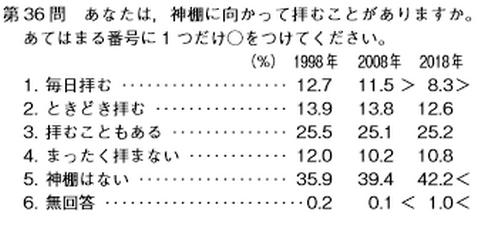
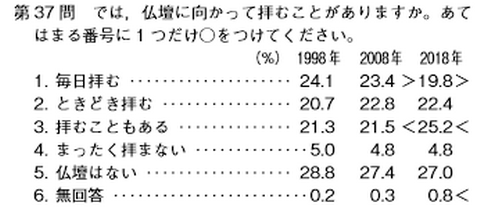
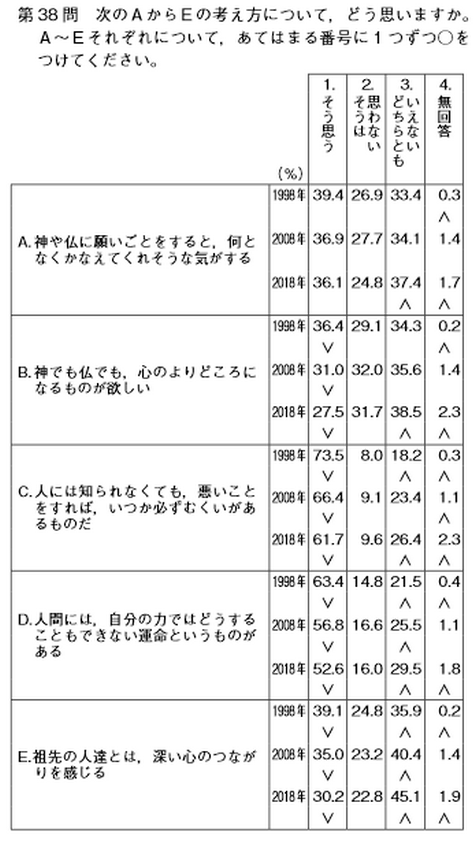
Question No. 39: Have you ever tried to find inner peace through Zen or similar religious exercises or to reflect on your own maturing process and human life?
1. yes 2. no 3. no answer
Question No. 40 is presented in the essay mentioned at the beginning in a somewhat simplified and clearer way (p. 58) as follows: [The percentages are rounded up/down compared to the chart on the right.]
Can you imagine that gods live in mountains and rivers (= in nature)?
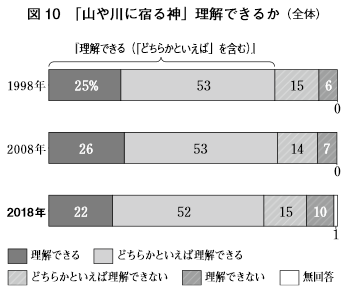
[from left to right: Yes, Rather yes, Rather no, No, No answer].
Question No. 41: Have you ever, when faced with a very difficult problem, prayed to the gods or Buddha?
1. yes 2. no 3. no answer
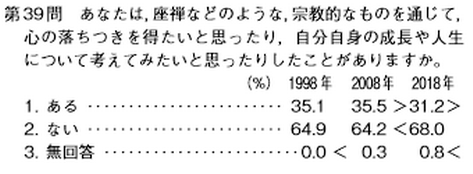
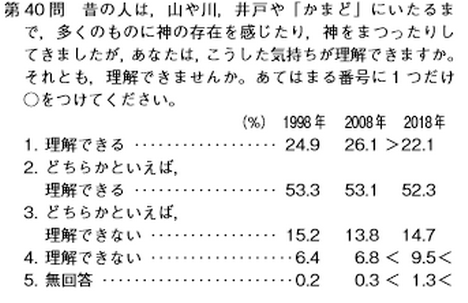

Question No. 42: There are various religions in Japan today. To which one (including your own) do you feel a special closeness? Multiple answers possible.
1. Buddhism
2. Shintō
3. Christianity4. Islam5. Other religion
6. To no religion
7. No answer
Question No. 43: Have you ever done the things listed under A to E? One answer each.
1. Often 2. Occasionally 3. No 4. No answer
A. Shrine/temple visit on New Year's Day
B. Visiting cemetery on certain Buddhist holidays
C. Receiving amulets or talismans (at shrines/temples)
D. buy a horoscope (at shrines/temples)
E. get a fortune telling
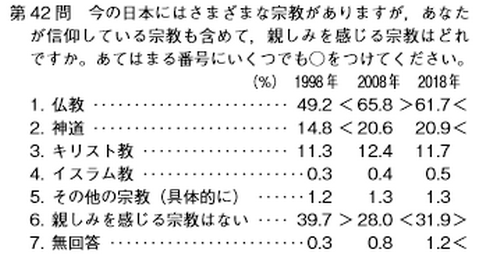
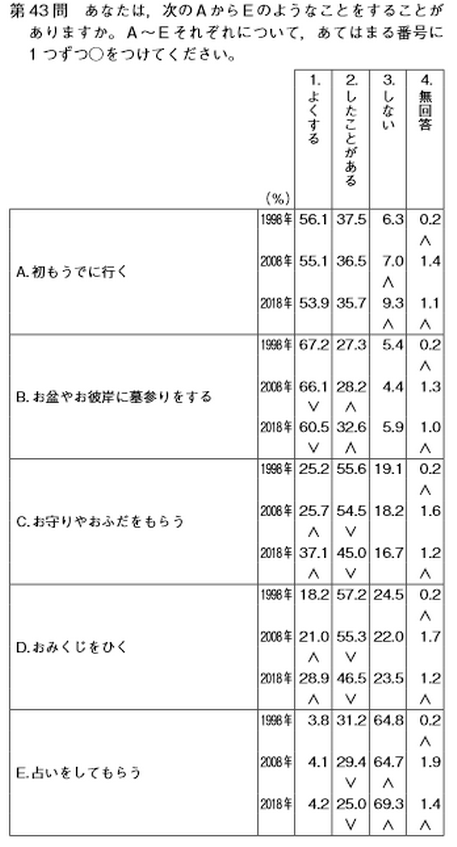
Question No. 44: Do you think religion is useful for the things listed from A to C, or do you not think so? Tick in each case what comes closest to your feeling.
1. I believe 2. I tend to believe 3. Neither 4. I tend not to believe 5. I don't believe 6. I don't know 7. No answer
A. to deepen the bonds between people
B. to increase people's ethical awareness
C. to help the poor
Question No. 45: Now another topic. How do you feel about your mental and physical health?
1. Excellent
2. Very good
3. Good
4. Normal
5. Poor
6. Don't know
7. No answer
Question No. 46: Now a question about your family. Is there anyone in your family whose mental or physical health is not good?
1. no 2. yes 3. no answer
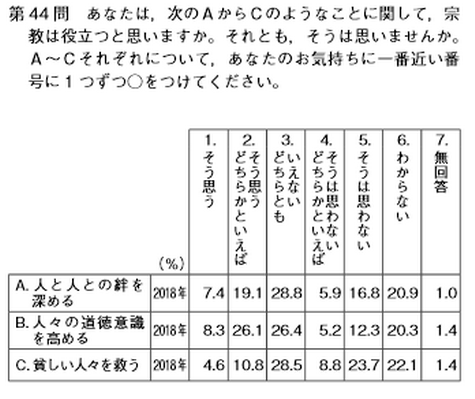
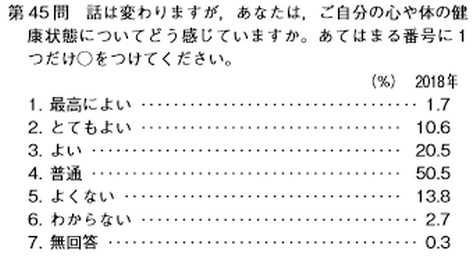
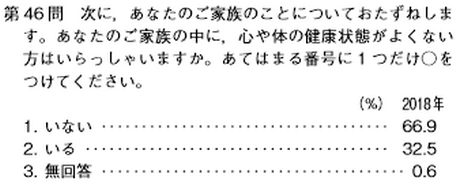
Additional question no. 22: In your daily life, is there a religion you believe in? Only one answer. What is meant here is not religion in the context of weddings or funerals, but a religion that you personally believe in in your daily life.
1. Buddhism
2. Shintō3. Christianity
4. Other religion (specifically)
5. No religion
6. No answer
Additional question No. 23: How often do you visit temples, shrines or churches for religious reasons (excluding weddings or funerals)? Only one answer.
1. Not at all
2. Less than once a year
3. Once or twice a year
4. Several times a year
5. Once a month
6. Two/three times a month
7. Almost weekly
8. Weekly
9. Several times a week
10. I don't know, can't remember
11. No answer
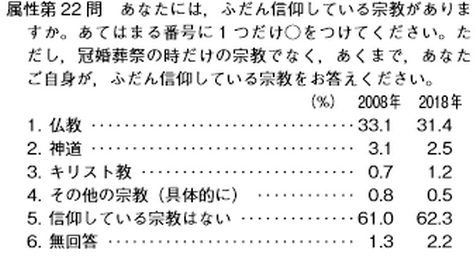
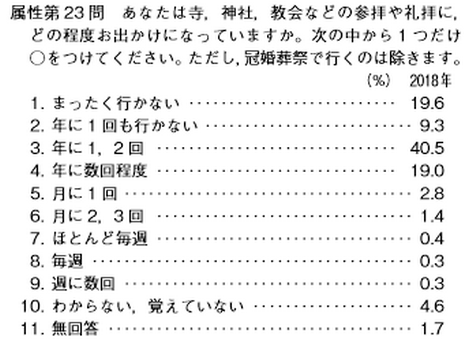
In the text of the article cited here, there is some additional information about the survey, especially about the differences between the population groups. While the differences between men and women are relatively small, the values between the group of the over 60s and the 18-39 year olds sometimes increase threefold. This is an important point to keep in mind when evaluating the survey results. The table opposite shows this using the example of one of the answers to question 29, namely the percentage of those who describe themselves as not religious at all.
The columns are as follows: 1st men 2nd women 4th men 18-39 5th men 40-59 6th men over 60 8th women 18-39 9th women 40-59 10th women over 60
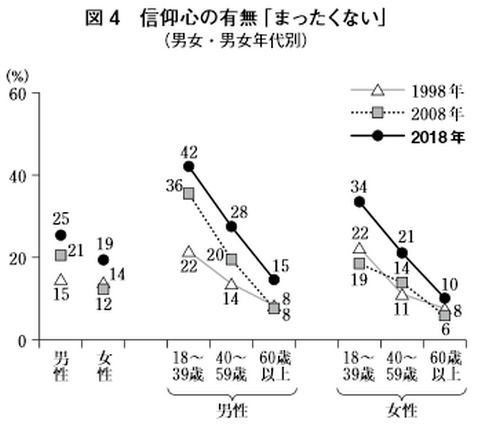
(p. 54)
This table also shows the considerable differences between the age groups. It is about the percentage of those who pray daily before the Buddhist home altar (i.e. at least put their hands together and bow). In 1998, the difference is more than twenty times between those aged 19-29 and those over 70. In 2018, it is just under six times, as the percentages have interestingly increased in the youngest group, while they have become significantly less in all other age groups. Also worth noting are the diagonal connections graphically highlighted in the table, which show that the percentages of an age group increase with increasing age (i.e. after every ten years in the table).
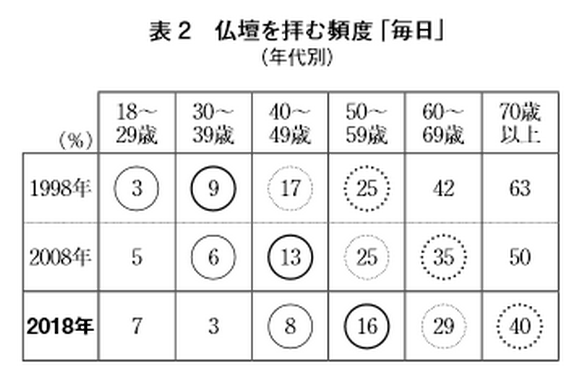
(p. 56)





